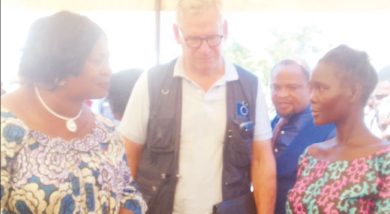Refugees or students?
 The exhaust fumes of hurried policies and weak strategies in Malawi’s tertiary education have also reared another ugly head, this time at Bunda College in Lilongwe.
The exhaust fumes of hurried policies and weak strategies in Malawi’s tertiary education have also reared another ugly head, this time at Bunda College in Lilongwe.
Here, first year students and some staff are being subjected to a substandard teaching and learning environment, making some of them argue it is like learning during a war situation.
About 700 first years are having to endure lectures in a crammed tent, which is hot and has poor lighting effects. The dons also have to shout their delivery through a public address (PA) system.
The scenario is a stark reminder of how quality plummeted during the introduction of free primary school education after an ill-prepared UDF government rushed the initiative without supporting architecture and ‘fiscus’.
The Bunda tent saga follows President Bingu wa Mutharika’s political decision to increase the intake of University of Malawi (Unima) to quell groans that followed the reintroduction of the controversial quota system of admitting students into the country’s public universities.
For Bunda, this has meant more than tripling of the current first year intake to over 700 students from about 200, putting pressure on already limited infrastructure and resources at the college.
Challenges of learning in a tent
While a tent at a university college is a marked improvement from learning under a tree as is the case in most primary schools nationwide, the outcome is the same: The standards are dwindling at an alarming rate.
The Nation crew’s visit to the college last week confirmed the students’ lectures in a big tent, with dons struggling with a PA system to reach out.
In separate interviews, Bunda College Students Union (BCSU) and University of Malawi Students Union (Umsu) leaders expressed concern over the development.
They argued learning in the tent has adversely affected studies for the first year students.
BCSU president Fraction Mphwitiko said using the tent has almost turned students into “soldiers waiting for a warâ€Â.
Said the student leader: “The situation is pathetic. This tent is used for first year students. Just imagine second year students used it to take examinations and after three hours, most of them complained of eye problems. The first year students spend almost three hours in the tent daily and we do not know what will happen after a year.â€Â
Mphwitiko said since the tent is multi-coloured, even the use of a projector does not help matters. He also said students are easily disturbed by noise from outside the tent.
First year students interviewed at the college said most of them and their lecturers complain about learning in the tent as it does not provide a good environment for studies since it is hot inside.
“The environment forces most lecturers and students to deliberately abandon lessons when the timetable indicates the tent as a venue. Powerpoint presentations are also faint as a result of reflection of light from the tent,†said one student.
According to Mphwitiko, the union complained to college management about the situation, only to be told that this is a temporary arrangement before new structures for the Lilongwe University of Agriculture and Natural Resources (Luanar) are constructed. No further details were given, according to the union leader.
This alone raises a huge question, given the civil service bureaucracy and inefficiency that the President also lamented about when he presided over a teachers’ graduation ceremony in Domasi recently.
He argued because of this inefficiency, the merging of institutions to create the Lilongwe University of Agriculture and Natural Resources is frustrating his plans to create six new universities in the country, let alone the completion of the Malawi University of Science and Technology (Must) at Ndata in Thyolo.
Industry experts also told The Nation after the visit that construction of learning infrastructure, like most major structures, takes long.
“It is not a short term or quick job,†said a contractor this week, who preferred anonymity for fear of losing government business.
He argued the Bunda students may have to endure their tent for a while.
“In fact, they should not expect anything this academic year, given that resources for the project have not been amassed and the Ministry of Education is dragging its feet on the new universities initiative,†he said.
In an attempt to improve visibility in the tent lecture room, Bunda management reportedly fixed a black plastic paper that runs across the middle of the inside of the tent, but most students claimed this has not solved the problem, but only made the tent even hotter.
Accommodation is a problem
Bunda College, located in Lilongwe Rural, about 35 kilometres from the capital city, was originally meant to accommodate 750 students. But following the increased intake, the college now has 2 500 students with about 700 of them in first year alone.
Among its structures, Bunda has 10 hostels with a capacity of 72 students each, translating into a 720-bed capacity. It also has four lecture rooms, six laboratoriesâ€â€each having a capacity of 45 students, two lecture theatres which accommodate about 100 students each, a hall and some departmental rooms.
This means that almost 1 750 students are accommodated in rented houses outside the campus. This is yet another challenge for the college.
The Nation found out that because of its rural setting, most houses rented by students have no electricity, piped water and are grass-thatched while some are not floored with cement. Off-campus students and mature entry learners interviewed said it is difficult to concentrate on studies in such living conditions.
The Nation also established that the shortage of lecture rooms has led to management turning the only cafeteria at the campus into a lecture room for undergraduate students, thereby forcing residential students to take their meals under a tree.
Said another student: “In the past, a university was a big motivator for most secondary school students, but the environment here does not induce the hard-working spirit in the young ones who, after attending good secondary schools, only end up learning in tents and eating under trees.â€Â
Some learn while standing
One of the lecturers, speaking on condition of anonymity, said in some instances, students in all the intakes are forced to learn while standing. In other cases, he said, they learn in shifts and have lectures up to 8:30 pm.
“Sometimes we are forced to cancel lectures because of shortage of classrooms,†said the lecturer.
Newly elected University of Malawi Students Union (Umsu) president Noah Mtiza said they discussed the Bunda challenges with college management who assured the union that new structures will be built. But one semester later, nothing has happened, said Mtiza.
According to the Umsu leader, Bunda reportedly invested almost K1 million (about $5 988) in the tent project.
But Bunda College principal Professor Moses Kwapata played down the situation.
Said Kwapata: “Come and see what is happening. This is a marquee like what is being used at Capital Hotel [in Lilongwe] to host high-profile workshops, weddings and other events. All that is being said about it is not correct.
“Would those who are complaining not want more children to come to college? Will they be happy if we tell them not to be in college and remain in the streets just because we have no infrastructure?â€Â
‘We expect a better deal’
But a Lilongwe-based parent lamented the Bunda development.
Said the father, whose child is among the first years: “As a parent, I don’t expect my child to learn under refugee-type of conditions once he or she goes for higher learning.
“I pay a lot for tuition and everything else. I expect a better deal.
“Why is it that our professors and the country’s leadership are always failing to get things right?â€Â
Ministry of Education spokesperson Lindiwe Chide said authorities are aware of the infrastructure challenges at Bunda that have resulted in some students learning in a tent.
Said Chide: “Definitely, it is not a conducive environment. However, the learning in a tent is a temporary measure, pending construction. The Ministry is putting together resources for construction of lecture halls.†She did not indicate any time frame.
Independent social researcher Francis Ng’ambi on Wednesday described the Bunda College situation as “not conducive to higher education and further exposes the multiple challenges tertiary education is facing in the country.â€Â
Ng’ambi, author of the Malawi Effective Delivery of Public Education published in 2011 by Open Society Initiative for Southern Africa (Osisa), said the poor learning environment has greater implications on the quality of education being offered.
“This means poor teacher-student relationship as crowded and over-flowing classes will translate into poor attention to many of the students,” he said.
Similar pressure for teaching and learning resources have also been reported at other Unima constituent colleges, notably the big onesâ€â€Chancellor College in Zomba and Polytechnic in Blantyre where, among others, some students learn while standing or by peeping through windows due to insufficient space in lecture rooms and lack of chairs.
Bundaâ€â€formerly a constituent college of Unima from which it is now delinked following the enactment of the Luanar Bill last Juneâ€â€will retain its name but under Luanar.
Other Luanar colleges are the Natural Resources College (NRC), the Chitedze Research Station and the Agriculture Research Trust (Aret).
In May 2010, Mutharika announced that government would embark on a project to construct six universities across the country. Apart from Luanar, others are planned to be in Nsanje, Mangochi, Mzimba, Nkhotakota and Thyolo.
So far, the only new university being constructed is the Must in Thyolo, which is yet to be connected to a supply and sanitation system.





